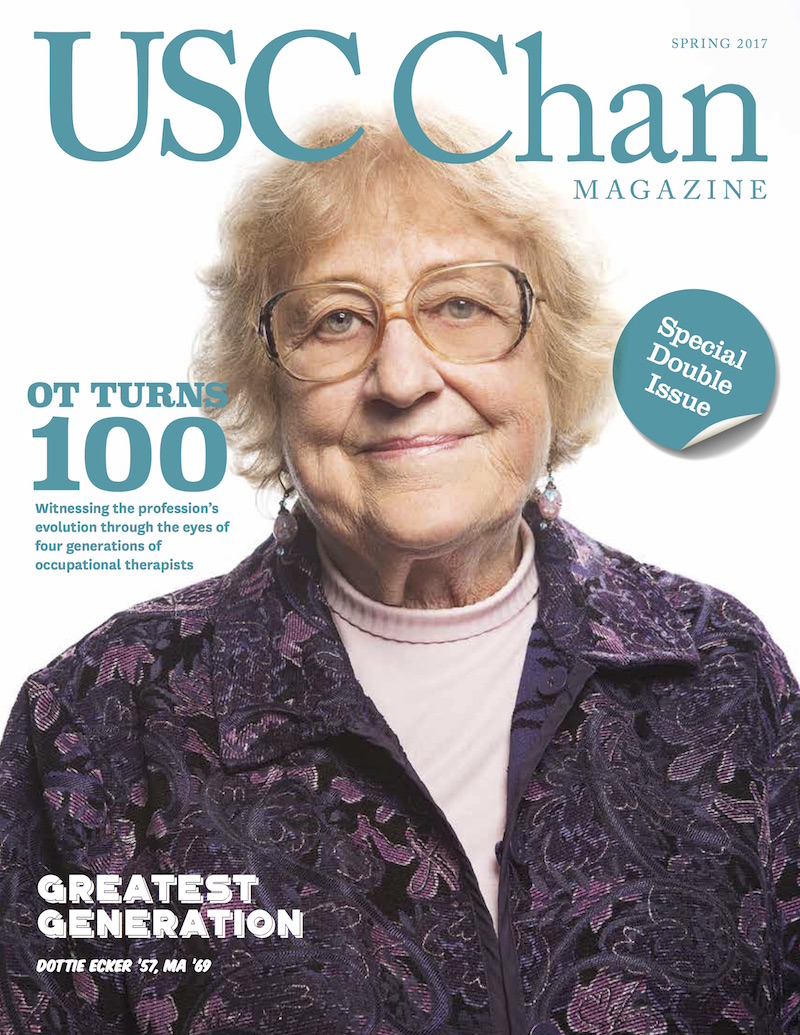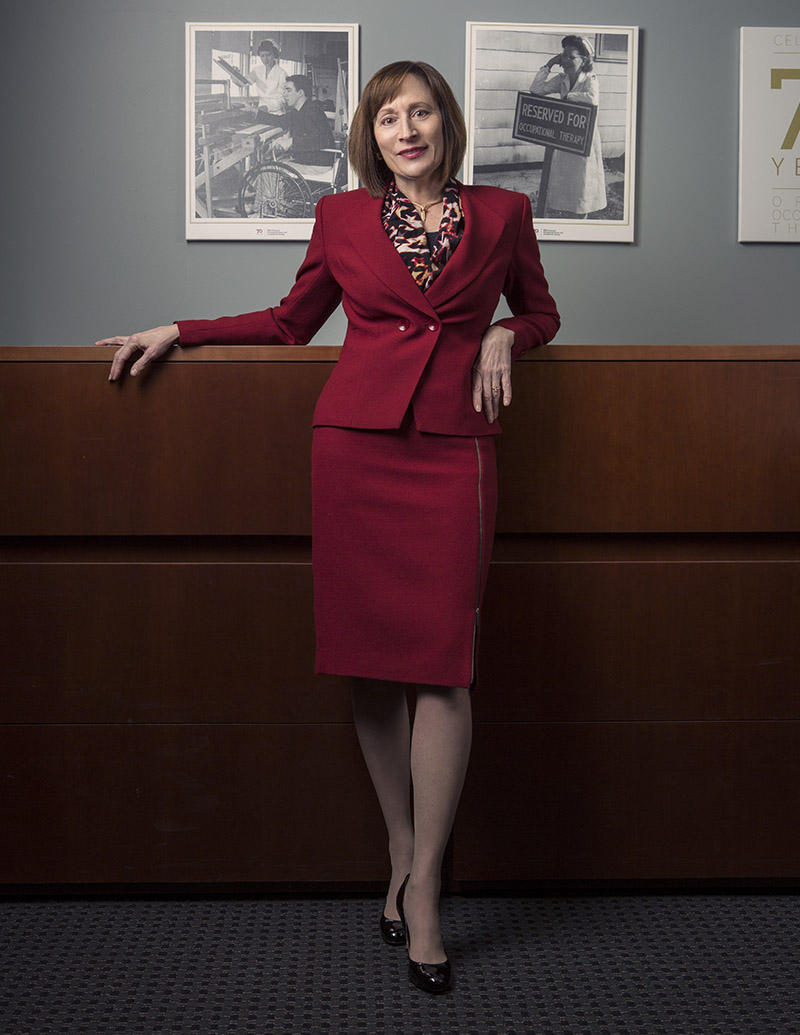The Road to Troy
Charting Grace Baranek’s route from her professional upbringing in Chicago to her new position as associate dean and chair at USC Chan.
By Mike McNulty ’06, MA ’09, OTD ’10
The recent hit film La La Land opens with a musical number set amid standstill traffic on a freeway interchange high above South Los Angeles. With the city’s downtown skyline — USC’s campuses at its outskirts — visible in the hazy distance, commuters momentarily escape the snarl with an impromptu song and dance on the lanes of the overpass.
“It’s another day of sun/Another day has just begun,” the chorus joyfully sings, portraying an ironic slice of daily life in the real “La La Land.” Endless sunshine is welcome solace to commuters stuck in seemingly perpetual traffic.
Despite an unusually wet winter in Southern California, it’s been nothing but sunshine inside the USC Chan division since newly appointed Associate Dean and Chair Grace Baranek arrived on campus in February. Baranek comes to USC from the University of North Carolina at Chapel Hill, where she had been a faculty member since 1996. Her most recent appointments at UNC included associate chair for research in the Department of Allied Health Sciences and professor in the Division of Occupational Science and Occupational Therapy.
When asked about what drove her decision to make the move from Tar Heel to Trojan, Baranek smiles wryly.
“Well, it certainly wasn’t the traffic!”
Route 66 — that most famous of American highways and an enduring icon of westward migration — stretches nearly 2,500 miles from the Santa Monica Pier in California to the shores of Lake Michigan in Chicago. Baranek likewise traces her own route to the City of Angels back from the Windy City. The proud Chicagoan (“Go Cubs!”) first discovered occupational therapy as an undergraduate student at the University of Illinois, thanks to the profession’s appealing mix of creativity and science in tangible service to improving the lives of others.
She earned her bachelor’s degree in occupational therapy in 1981 and spent her early career in pediatric practice working in various acute, rehabilitation, outpatient and school-based settings. But it was during the late 1980s and early ’90s while working at the Easter Seals Day School in Chicago that her career trajectory took a pivotal turn.
“I had all these burning questions that I was looking for definitive answers to,” she recalls. “How can we better identify risk markers of autism in infants and toddlers? And how early can we do so? What interventions should we be providing in the early years in order to maximize outcomes later in life?”
To find her own answers, Baranek entered the developmental psychology doctoral program at the University of Illinois at Chicago. The quality of her scholarship and its potential implications gained attention before she even completed the program. In 1995, she received a $20,000 award from the American Occupational Therapy Association to fund her research. One year later, she earned her PhD with her dissertation entitled, “Early Predictors of Autism Using Retrospective Video Analysis.”
“The dissertation award from AOTA was extremely encouraging to me, as a young scientist looking to take the next step in academia,” Baranek says. “It affirmed the significance of my work and the critical importance of early identification of autism spectrum disorder.”
Upon graduating from UIC, Baranek joined the faculty at the University of North Carolina in the autumn of 1996, and recognition for her research continued to grow. In 1997, she received a UNC junior faculty award to study sensory processing disorders in children with Fragile X syndrome, a genetic condition that causes various developmental problems including autistic-like behaviors that impact daily functioning.
Beginning in 2003, she received her first federal research support as the principal investigator of the Sensory Experiences Project. Funded by the NIH National Institute of Child Health and Human Development, the 10-year study, totaling more than $4.5 million in federal grants, aimed to explain the developmental course, mechanisms and functional effects of sensory features in children with autism spectrum disorder.
“This research confirmed that sensory features were quite common but varied across children with ASD,” Baranek explains. “Moreover, sensory patterns, such as hypo- and hyper-responsiveness, were found to impact children’s social and adaptive development in different ways, and also limited the extent to which families could participate in community activities.”
In 2010, Baranek was appointed associate chair for research at the UNC Department of Allied Health Sciences, a nod both to her own expertise and to her abilities for fostering the infrastructure, relationships and environments necessary for others’ research programs to thrive. This administrative leadership experience helped cement Baranek as the successor to Florence Clark, who announced in 2015 that she would be stepping down from her administrative appointments after 27 years as the chair of USC Chan. Baranek’s selection was made public in an August 2016 announcement by Avishai Sadan MBA ’14, dean of the Herman Ostrow School of Dentistry of USC, which oversees USC Chan.
But while she’s hesitant to draw any comparisons between herself and her predecessor, Baranek points to lessons that she has learned from Clark, who is continuing her own scholarship at USC Chan as the holder of the Mrs. T.H. Chan Professorship in Occupational Science and Occupational Therapy.
“Dr. Clark has been a tremendous leader and role model for our whole field,” Baranek says. “She’s shown me how to leverage strengths and align resources in order to realize a vision of USC Chan well into the future.”
This deep sense of enduring continuity and appreciation for USC’s long-standing influence upon the occupational therapy profession is all the more impressive seeing as Baranek has only been an official Trojan for less than two months.
“You don’t get to be a top-ranked program by doing one thing exceptionally well,” she says. “You get there by doing everything exceptionally well.”
Considering the career body of work that has earned her widespread respect and international renown, Baranek has shown that she knows what it takes to do many things well. That is, perhaps all but the one thing that every Angeleno, no matter how long they have lived in Southern California, would like to improve.
“I’m not really sure how to fix the L.A. traffic!” she says, with a laugh.
⋯







